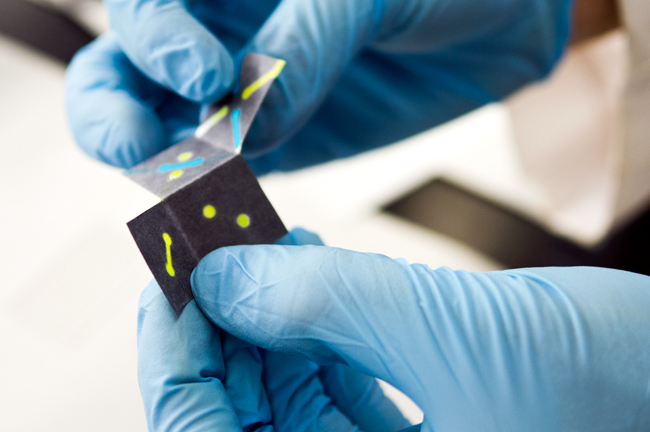Correction on 03/25/12 at 9:07 p.m.: Because of a reporting and editing error, this article incorrectly stated that the Paper Analytical Device can now be used to test for HIV and malaria. The story now reflects that the technology may be able to test for such diseases.
As a result of work done by a UT graduate student, the ancient Japanese art of paper folding may be used to test for such diseases as HIV and malaria.
Chemistry professor Richard Crooks and chemistry graduate student Hong Liu developed an origami Paper Analytical Device, or oPAD, that chemically analyzes human bodily fluids and identifies different biomarkers that signal the presence of disease. The device works with folded paper to run complex tests using less surface area and costs under 10 cents. Liu said he is focusing his device to recognize AIDS and malaria, but hopes to use it for the diagnosis of other diseases in the future. Although the oPAD is receiving recognition, it is still in its clinical stages, Liu said.
“We are trying to head toward it testing more things,” Liu said. “We are trying to find more profiles that the test can recognize so it can have a more practical application.”
Marcus Sanchez, spokesman for AIDS Services of Austin, said the test is cost efficient to the point that it would allow for organizations like AIDS Services of Austin to test more patients that are at risk of the disease because the main constraint when it comes to testing is funding.
“Tests are expensive,” Sanchez said. “Currently we test people that are at the highest risk of the disease, such as people who have unprotected sex with multiple partners, but with [the oPAD] it will allow us to test more people.”
Because of its simple design and cost efficiency, the oPAD will be used in developing nations where limited access to HIV and malaria testing is difficult to come by, Crooks said.
Andrew Johnson, biology and sociology senior and education coordinator of Face Aids, said the test would be important in developing nations because it could be a widespread preventative health measure that would be readily available in countries where there is no money in public health departments.
“Knowing their status is an important mechanism in AIDS prevention,“ Johnson said. “It allows people to make responsible decisions about their health and how it would affect others.“
Liu said the initial idea for oPAD was inspired from his schooling in China and from an article he read by Harvard professor George Whitesides, who conducted research on similar testing devices.
“While at school in China the teacher taught us how to fold origami,” Liu said. “Then when I read the article I remembered that paper folds easily and tests really well.”
Liu said the test is more effective than other methods currently on the market.
“The oPAD’s 3-D design allows you to integrate more functions than the stuff on the market,” Liu said.
Printed on Friday, March 23, 2012 as: Paper sensor may lower disease testing costs





















